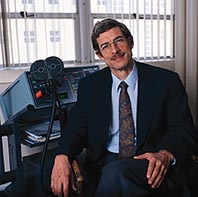Depression's victims sometimes find that drugs and therapy can't help. Soon there may be a new solution -- the power of magnetism.
By Larry Zalin
Mary Manning would pray for relief from her deep depressions. Any kind of relief. Death tempted her, but she knew her suicide would cause her husband and young daughter terrible grief and pain. Some other end--by heart attack or car crash--was more appealing. There were times such thoughts actually comforted her.
Medications and therapy didn't help, so at the advice of her doctor she tried electroconvulsive therapy (ECT), a controversial but effective means of helping people with intractable depression. She began to feel freed of her depression: able to sleep again, eat a meal, experience less anxiety. It was a blessing, but Manning found she couldn't share her joy with others.
"Nobody bats an eye when electricity is delivered to a stalled heart," she wrote in her memoir, Undercurrents. "There is no outcry. In fact, it's considered a miracle. A person passes from life to death to life again through the application of electric current to the heart. But try talking about the same thing with the brain, and it's no miracle. Suddenly, words like torture and mind control populate the descriptions."
The idea of ECT still conjures up nightmares of "shock treatment." Images from One Flew Over the Cukoo's Nest and The Bell Jar are burned into the American consciousness. Despite the use of anesthesia and muscle relaxants, advances that have made ECT a painless procedure, it is still often seen as brutal, punitive invasion of a person's brain. Yet mental-health experts say that ECT is the most effective therapy for people who can't be helped by antidepressants such as Prozac or Paxil.

Harborview Director of Inpatient Psychiatry and UW Professor David Avery. Photo by Kathy Sauber.
Patients who now face the choice of desperate bouts of depression or ECT may soon have a third way-the power of magnetism. Called transcranial magnetic stimulation, the process focuses electromagnetic energy to one site of the brain, sparing the patient the troublesome side effects associated with traditional ECT.
"In virtually every study comparing ECT with antidepressant medications, ECT has been found to be more effective," explains UW Psychiatry Professor David Avery. "The down side of ECT, of course, is temporary memory disturbance because ECT provides a very diffuse stimulation of the brain. The beauty of magnetic stimulation is that it provides a very focal stimulation."
|